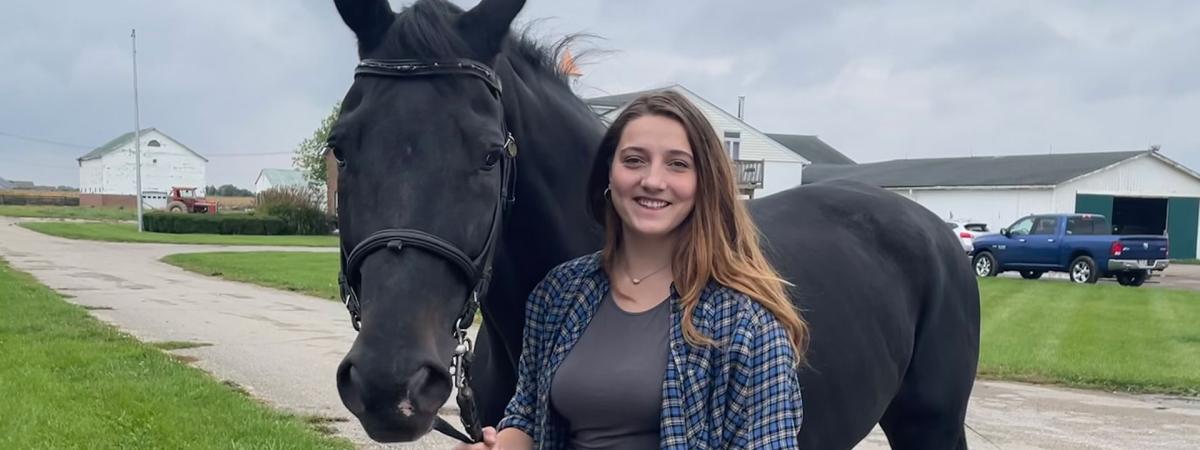
Enjoying the ride
Maggie Kaniecki began riding horses at age six and competed throughout high school and college. This lifelong passion of hers taught her more than just horsemanship.
Maggie Kaniecki began riding horses at age six and competed throughout high school and college. This lifelong passion of hers taught her more than just horsemanship.
“Working in partnership with animals who have their own personalities … we can’t talk to them,” she explained. “So we have to find a way to meet in that common ground and communicate.” That lesson, she said, translates directly to working in law: meeting clients where they are and translating complexity into clarity.
Raised in North Royalton, a suburb of Cleveland, the third-year law student Kaniecki didn’t start off wanting to be a lawyer. She began her higher education journey at The Ohio State University intending to become an architect.
“I was really interested in the built environment and how it makes people feel in those spaces,” she recalled. But she quickly found that architecture’s model-making and material focus felt too solitary.
“Every day, hot-glue gun, trying to put pieces together,” she said. The shift to city planning opened up a more human-centered view, allowing her to consider concepts of accessibility and belonging in communities.
At Ohio State, Kaniecki’s program was small—about 27 students—and well connected to the regional planning commission for central Ohio counties. That network led to a year-long internship in Somerset, Ohio (in rural Perry County), where she wore multiple hats: tour guide, grant writer, secretary and local government staffer. It was during this experience—away from the bustle of the suburbs she grew up in—that she noticed something striking: In many rural areas, legal professionals were far less available, and city planning often intersected with law.
“Seventy-five percent of attorneys in the state are in six counties, [and] that doesn’t match the population layout either,” Kaniecki said. “So that means there are a lot of counties out there that maybe only have a judge and a prosecutor.”
That realization helped set her sights on law school.
Kaniecki entered Case Western Reserve University School of Law in fall 2023 as a Burke Scholar through the Coleman P. Burke Center for Environmental Law. The scholarship supports students interested in environmental and public-interest law. Kaniecki says she was drawn to CWRU partly because of the Burke Center opportunity and partly because of the law school’s community-based response to the 2023 East Palestine chemical-train disaster:
“Our clinic was one of the few to keep providing free legal services, and we remain active in the community, fostering support and trust,” she said.
Beyond environmental law, she appreciates CWRU’s flexibility. “The law is so multifaceted,” she said. “I can take energy law, income tax, zoning—all things that will make me a stronger, more versatile lawyer in a rural community.”
Now serving as president of the Student Bar Association (SBA), Kaniecki describes herself as a “big, school-spirit kind of gal.” She previously served as treasurer and as president of the student organization, Law for the Environment, Animals and Food. Her current focus as SBA president is continuity.
“Law school’s three-year cycle means we’re constantly reinventing ourselves,” she said. “I want to give student leaders better programming materials and create a legacy that lasts.”
After graduation, Kaniecki will join Critchfield, Critchfield & Johnston in Millersburg, Ohio—one of the firm’s five mid-Ohio offices. There she’ll focus on real estate, estate planning and corporate work, bridging her planning background and legal training.
“It’s my jack-of-all-trades role,” she said. “Exactly what rural communities need.”
Her advice to new law students: “Enjoy the ride. Whatever you go in looking for is exactly what you’re going to take out of it.”




